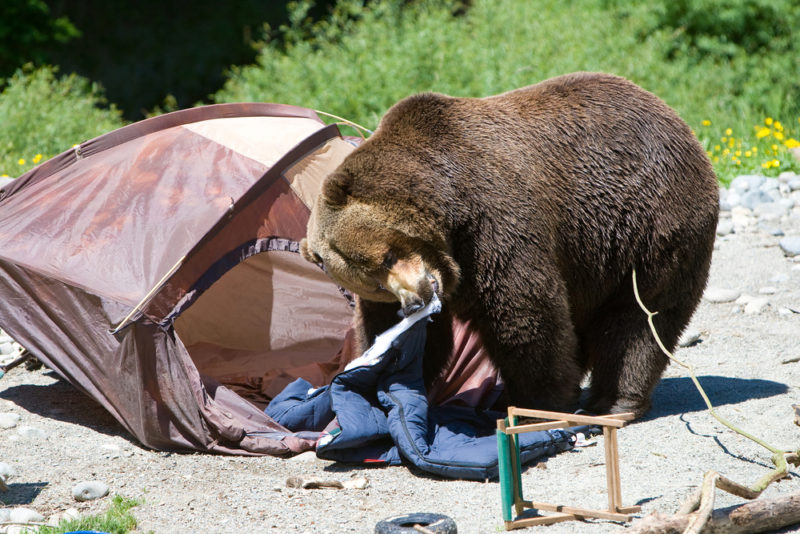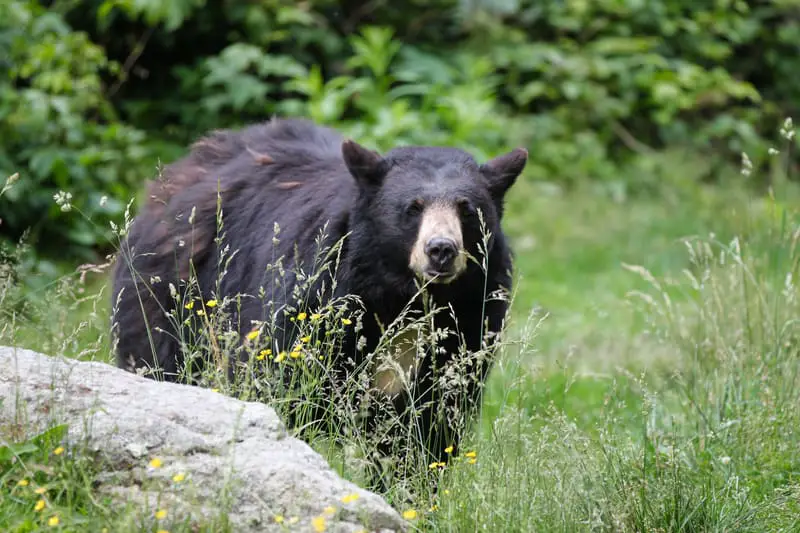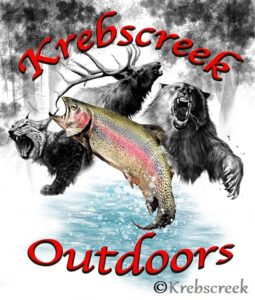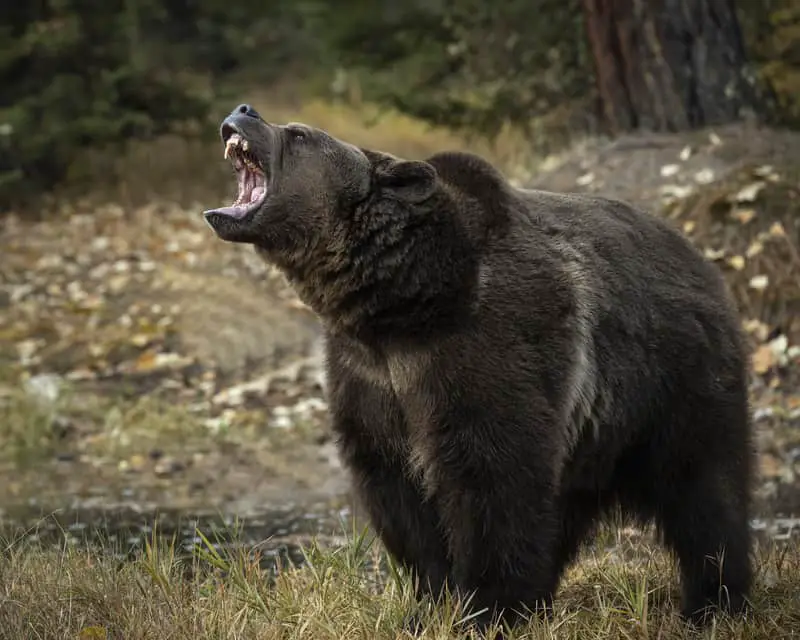People need to get out and spend time in the outdoors. In my opinion, those who live and die in our major population centers without seeing some wild country have been cheated by life. As you get further from civilization, though, you leave its safety nets behind, and you have to become more responsible for your own well-being. A lot of the best places to camp on this planet have bears as residents. When you go on a trip into bear country, there are ways you can prepare that put the odds in your favor that nothing bad will happen to you or those who are with you. This article will inform you on the best practices you can use to go camping in bear country.
Setting Up Camp in Bear Country
- Use some common sense in choosing a campsite. For instance, don’t pitch your tent alongside a well-used trail with fresh bear tracks on it. Also, avoid berry patches, salmon streams, or any other obvious bear attractant.
- Set up your camp so the odds are as low as possible that a bear will disturb your slumber in the middle of the night. This means that your tent should be pitched a long distance from where you cook and eat your food. From my reading, the distance should be at least a hundred yards.
- Your food and food scraps need to stay at the cooking and eating area. Place them in a bear-proof container or a bear bag, and then hang the container far enough off the ground that it isn’t an issue for a hungry Grizzly. If you’re in Black Bear country, they can climb trees, so you’ll need to get a little more creative with how you hang your essential items. Also, store any aromatic items that might attract bears with your food.
- Always sleep in a tent or a camper if you’re near the road when you’re in bear country.
At Your Tent
- Never take food back to your tent
- Never sleep in the same clothes that you cooked or ate in.
- You should have good dependable light and a canister of bear spray in your tent with you. You should already be familiar with how and when to use the bear spray. The following quote is from Mountain Journal. “Scientists found that bear spray was 92 percent effective in deterring attacks from the three species of North American bears—brown, black and polar— in Alaska between 1985 and 2006; 98 percent of people carrying bear spray who got into close encounters with bears were uninjured.” Source
- The following quote comes from a bear safety course given jointly by the Wyoming Guides and Outfitters Association and the U.S Fish and Wildlife Service.
“Course presenters discourage the use of firearms to mitigate bear attacks because the practice has resulted in much greater frequency and severity of injuries to people involved. The reliability and safety of pepper spray over other deterrence methods have also been promoted by the Interagency Grizzly Bear Committee, which has studied bear encounters, and the University of Montana Border Grizzly Project, which has conducted lab studies testing the spray on real bears.
Based on the investigation of bear attacks since 1992 by Service law enforcement agents, who help teach the course, persons encountering grizzlies and defending themselves with firearms suffer injury about 50% of the time. During the same period, persons defending themselves with pepper spray escaped injury over 90% of the time, and the remaining 5-10% experienced shorter duration attacks and less severe injuries.” Source
- If you’re familiar with its use, it’s not a bad idea to keep a pistol in your tent as a back up to the bear spray. The pistol should be the backup plan, though. In a survival type situation, you’d have to have nerves of steel and be a crack shot to make a killing shot on an enraged Grizzly in the middle of the night with a pistol. If the bear is on top of you and all you have to do is stick the barrel in his ear and pull the trigger, your chance of a killing shot increases dramatically.
- Before you go to sleep, you need to go over in your mind the steps you’ll need to take in the event of a nocturnal bear encounter.
There Is a Bear On The Campsite, What Should I Do?
- If a bear outside your tent wakes you up in the middle of the night, your initial response should be to lie quietly and wait for him to go on his way. In the vast majority of cases, that’s how things will play out.
- In a situation where the bear starts poking at your tent, your next recourse is to start making some noise. The sound of a human voice is enough to send them on their way a good majority of the time.
- When you have a bear that is still determined to get into your tent, you need to punch, kick, or do whatever it takes. At this point, your fighting for your life.
- Remember, bear spray is only effective when you spray the bear in the face. Spraying it around inside your tent will only succeed in giving you the effects that you intended to give the bear. When the bear gets his head inside the tent, that’s when you give him a shot of bear spray.

Are You Safe From Bears In A Tent?
A tent provides an additional security layer; however, they will not keep a determined bear out for very long. In areas where bears have become habituated to people, your a little less safe than you are in true wilderness country.
A tent will provide a psychological barrier to an inquisitive bear. This will give you some time, even if it’s only a few seconds, to collect your wits and react appropriately to the situation.
I recommend that you never sleep under the stars in bear country. I also recommend that you keep a reliable flashlight and bear spray in your tent with you. Also, before you go to sleep at night, you need to rehearse in your mind the steps you will need to take should a bear situation arise.
Using a Bear Fence
What is a bear fence, you may ask? It is a portable electric fence that you can use to keep bears out of your campsite. They are very light. Some weigh less than 4-pounds. This makes it very doable to take one in your backpack. You can find them in different systems to cover whatever area that best suits your needs.
For power needs, a car battery can power them. Some conveniently work on two D batteries.
Should I Yell at a Bear?
It depends on the situation. If you’ve determined that a bear intends to make a meal of you, the answer is yes. If a bear is trying to crawl in your tent with you in the middle of the night, the answer is also yes.
When you come across a bear, by happenstance, the answer is different. If the bear hasn’t noticed you, you should try to quietly back out of the situation. If the bear knows your there, you need to quietly and calmly talk to him so that he can identify you as a human. At the same time, doing this, try to extricate yourself from the situation slowly.

How common are bear attacks?
It gives no consolation to the person who is attacked. The truth is, though, that bear attacks are actually sporadic. According to a paper published by the Journal Scientific that examined Brown Bear attacks worldwide from the year 2000 through 2016, there around 40 attacks per year. Around 11 of those happen in North America. Around 14% of those attacks result in fatalities. Source
There around 600,000 Black Bears in North America. Source As compared to 55,000 Grizzly Bears. Over the last 20 years, Black Bears have killed 25 people. That works out to 1.25 Black Bear related fatalities in North America per year. Source
Here’s some additional information provided by the National Park Service on bears in Yellowstone National Park. Since the park was established in 1872, 8 people have been killed by bears within the park. For perspective, I’ll give the number of fatalities that have occurred in that same time period within Yellowstone by various other causes.
- 121 people have died by drowning.
- 21 people have died of burn injuries after falling into the hot springs.
- 7 people have died after a tree fell on them.
- 6 people have died in avalanches.
- 5 people have been killed by lightning.
As you can see, the odds of dying due to a bear attack in Yellowstone Park are just about the same as being killed by a falling tree.
There are many more non-fatal bear attacks, though. On average, there is one Grizzly Bear caused injury in the Yellowstone backcountry per year. Source
The statistics for Glacier National Park are similar to Yellowstone. There are 1 to 2 non-lethal bear-related injuries per year. As for fatal attacks, since the park was established in 1910, bears have killed 10 people within the park. Source
What should you do if you encounter a bear?
- The U.S. Fish & Wildlife Service recommends that if you come upon a grizzly bear at close range and the bear has noticed your presence, drop a nonfood item like a hat on the ground and slowly back away. Source
- As you back away, speak softly to the animal to help it recognize you as a human. It would be best if you were carrying bear spray. If you are, now is the time to get it ready to use.
- As your backing up, you’re keeping a close eye on the bear but avoiding direct eye contact. If the bear charges, stand your ground. The bear will catch you if you decide to run anyway.
- If your carrying bear spray, you can deploy it when the bear is around 60 feet out. Aim downward to a point around 30 feet out between you and the charging bear. The spray will form a wall that the bear must pass through to reach you. Source
- At this point, it’s important to note that there are two types of bear attacks. The first is a defensive attack. This happens when you have surprised the bear, and it feels stressed by your presence. A defensive bear will woof, grind its teeth, or generally make a show of intimating you. It may make short bluff charges. It may swat the ground with its front feet. If all else fails in a defensive charge situation and the bear makes contact with you, drop to the ground on your stomach and play dead. Lace your fingers behind your neck to protect your spine. If the bear rolls you on your back, continue the roll and get back to your stomach. When the bear ceases the attack, continue to play dead until your sure it has left the area. If you move too soon, you could provoke it into resuming the attack.
- The second type of bear attack is predatory in nature. A predatory bear intends to eat you, so none of the above tactics, except for the bear spray, will help you very much. The following section is a quote from the Wyoming Game and Fish Department’s website.
SIGNS OF A PREDATORY BEAR
If you come across a bear acting in a predatory manner, you can expect to see any or all of the following behaviors.
1-Not defending anything
You may be aware of the bear for a long length of time.
2-Acting very interested in you
A predatory bear is often recognized when it appears to be intensely interested in you or deliberately approaches you.
3-Does not display stress behaviors
A predatory bear comes up to you WITHOUT displaying any stress (like moaning, woofing, jaw popping, or paw swatting).”
- If you’ve got a predatory bear on your hands, acting non-aggressive or playing dead will be of no help to you. The bear intends to eat you.
- Black Bear Attacks are almost always predatory in nature. Never play dead with a Black bear.
- You need to change tactics with a predatory bear and become aggressive. Look a predatory bear in the eye. Yell instead of talking softly. Make yourself look as large as you can and prepare to fight for your life. If the bear spray didn’t do the trick, this is where a pistol would come in handy. A predatory attack will only end if you scare the bear away, or you or it is dead.
- The last paragraph was a bit of a downer. I know. The truth is the truth, though. Fortunately, predatory bear on human attacks is extremely rare. The purpose of this article is to prepare you for camping and spending time in bear country. If you prepare yourself both mentally and physically for whatever comes your way, the odds of a positive outcome will be a lot more in your favor.
Don’t Allow Your Fears To Hold You Back.
As I pointed out earlier, your chances of being killed by a falling tree in Yellowstone park are about the same as being killed by a bear. Bear attacks on humans are rare occurrences. Use the information that I’ve presented to you and get out there and enjoy the great outdoors.
Also see: Black Bears, Tips for Living in Grizzly Bear Country
Recent Posts
The only venomous snakes in Washington State are Northern Pacific Rattlesnakes. The Northern Pacific Rattlesnake (Crotalus oreganus oreganus) is a sub-species of the Western Rattlesnake. Anyone...
Skunks are not classified as true hibernators. But they go into a state of torpor when the weather gets cold. Skunks are light sleep hibernators, along with opossums, bears, and raccoons. ...

